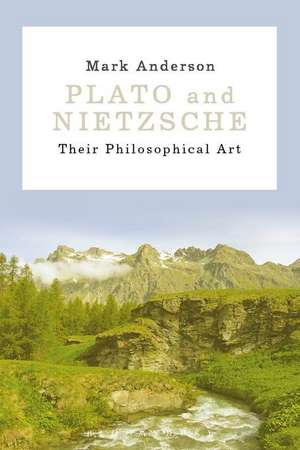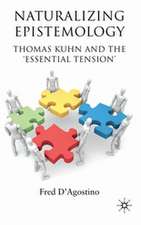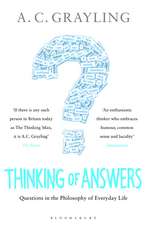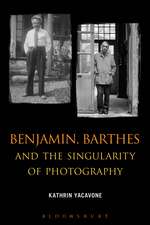Plato and Nietzsche: Their Philosophical Art
Autor Mark Andersonen Limba Engleză Paperback – 8 feb 2017
| Toate formatele și edițiile | Preț | Express |
|---|---|---|
| Paperback (1) | 185.93 lei 43-57 zile | |
| Bloomsbury Publishing – 8 feb 2017 | 185.93 lei 43-57 zile | |
| Hardback (1) | 773.65 lei 43-57 zile | |
| Bloomsbury Publishing – 27 aug 2014 | 773.65 lei 43-57 zile |
Preț: 185.93 lei
Preț vechi: 241.40 lei
-23% Nou
Puncte Express: 279
Preț estimativ în valută:
35.58€ • 37.01$ • 29.38£
35.58€ • 37.01$ • 29.38£
Carte tipărită la comandă
Livrare economică 14-28 aprilie
Preluare comenzi: 021 569.72.76
Specificații
ISBN-13: 9781350008106
ISBN-10: 1350008109
Pagini: 240
Dimensiuni: 156 x 234 x 19 mm
Greutate: 0.39 kg
Editura: Bloomsbury Publishing
Colecția Bloomsbury Academic
Locul publicării:London, United Kingdom
ISBN-10: 1350008109
Pagini: 240
Dimensiuni: 156 x 234 x 19 mm
Greutate: 0.39 kg
Editura: Bloomsbury Publishing
Colecția Bloomsbury Academic
Locul publicării:London, United Kingdom
Caracteristici
An exploration of key philosophical areas for both Nietsche and Plato including: art, metaphysics, ethics, and the nature of philosophy
Notă biografică
Mark Anderson is Associate Professor and Chair of the Department of Philosophy and Director of Classics at Belmont University, Nashville, Tennessee, USA. He is the author of Pure: Modernity, Philosophy, and the One (2009) and translator of selections from Plato's "myths" in Gods, Heroes, and Monsters: A Sourcebook of Greek, Roman, and Near Eastern Myths in Translation, edited by Carolina López-Ruiz (2013).
Cuprins
Preface AcknowledgementsConventions Introduction 1. Art and Reason2. Being 4. Becoming5. Noble and Good6. Sophia and PhilosophiaNotesBibliographyIndex
Recenzii
This is a comprehensive, elegant, and meticulous study of Nietzsche's attempt to challenge and supersede Plato's profound legacy. Mark Anderson's ambitious goal, which is both personal and scholarly, is to explore the creative artistry that binds these two thinkers together in an eternal and unresolved struggle. I think he succeeds to a remarkable degree.
According to Nietzsche, a philosophical system can be "refuted and dead, but the person behind it is irrefutable, the person aways remains immortal - for instance, Plato." Mark Anderson's study of how Nietzsche reacts and responds to the irrefutable Plato can be recommended to philosophers, classicsts, and intellectual historians alike. It will be welcomed by anyone interested in the filiation of ideas who is prepared to think afresh about the real aims of Nietzsche's project.
This excellent and intriguing book should be recommended not only to anyone interested in Plato and Nietzsche, but also to anyone interested in philosophy.
Written with knowledge, wit, skill and profound love for philosophy as a way of life, this beautiful introduction to the intellectual adventures of Plato and Nietzsche is also an authentic philosophical achievement on its own right.
Nietzsche saw Plato as his chief philosophical rival, but the relationship between their thought proved to be far more complicated than one of simple opposition. This is the first book devoted to this complex relationship. With scholarly rigor, lively writing, and equal appreciation of each philosopher, Anderson cuts a new path for those interested in either.
Writing incisively and with disarming modesty and sincerity, Anderson engages the reader in imaginary, inward conversations with Plato, Nietzsche and himself. As befits the peripatetic tradition of philosophy, one is transported now to ancient Athens, now to nineteenth century Alpine Sils-Maria.
In this work of philosophical acumen and literary sensitivity, Mark Anderson enters the ring with Plato and Nietzsche, not to adjudicate their contest, but to wrestle with them over the question of what it is to be a philosopher who lives in the truth.
This is a deftly written and well-researched exploration of the relationship between two of the most important figures in Western philosophy, Plato and Nietzsche. It makes a substantive contribution to the ongoing conversation about Nietzsche's relationship to the ancient world that is likely to inspire interest in and further research on the subject. Anderson should be applauded for his efforts.
According to Nietzsche, a philosophical system can be "refuted and dead, but the person behind it is irrefutable, the person aways remains immortal - for instance, Plato." Mark Anderson's study of how Nietzsche reacts and responds to the irrefutable Plato can be recommended to philosophers, classicsts, and intellectual historians alike. It will be welcomed by anyone interested in the filiation of ideas who is prepared to think afresh about the real aims of Nietzsche's project.
This excellent and intriguing book should be recommended not only to anyone interested in Plato and Nietzsche, but also to anyone interested in philosophy.
Written with knowledge, wit, skill and profound love for philosophy as a way of life, this beautiful introduction to the intellectual adventures of Plato and Nietzsche is also an authentic philosophical achievement on its own right.
Nietzsche saw Plato as his chief philosophical rival, but the relationship between their thought proved to be far more complicated than one of simple opposition. This is the first book devoted to this complex relationship. With scholarly rigor, lively writing, and equal appreciation of each philosopher, Anderson cuts a new path for those interested in either.
Writing incisively and with disarming modesty and sincerity, Anderson engages the reader in imaginary, inward conversations with Plato, Nietzsche and himself. As befits the peripatetic tradition of philosophy, one is transported now to ancient Athens, now to nineteenth century Alpine Sils-Maria.
In this work of philosophical acumen and literary sensitivity, Mark Anderson enters the ring with Plato and Nietzsche, not to adjudicate their contest, but to wrestle with them over the question of what it is to be a philosopher who lives in the truth.
This is a deftly written and well-researched exploration of the relationship between two of the most important figures in Western philosophy, Plato and Nietzsche. It makes a substantive contribution to the ongoing conversation about Nietzsche's relationship to the ancient world that is likely to inspire interest in and further research on the subject. Anderson should be applauded for his efforts.













